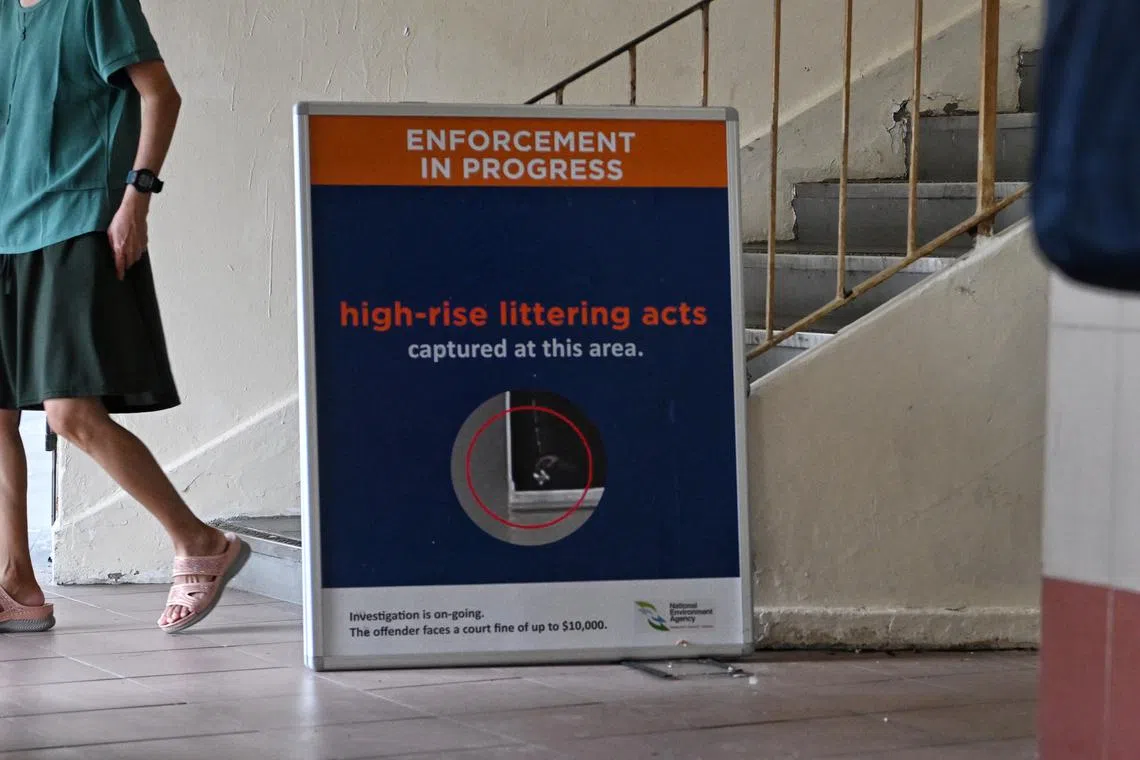Flat owners to be presumed guilty of high-rise littering unless proven otherwise under proposed law
Sign up now: Get ST's newsletters delivered to your inbox

An average of about 1,500 enforcement actions have been taken by NEA annually from 2017 to 2021.
ST PHOTO: KUA CHEE SIONG
Follow topic:
SINGAPORE - From July 1, a flat owner will be found guilty of littering if he cannot prove within a given time that he is not responsible for the offence.
Introduced in Parliament on Monday, the Environmental Public Health (Amendment) Bill will make it easier and faster for the National Environment Agency (NEA) to tackle high-rise littering as complaints continue to mount.
Such complaints almost doubled to an average of 29,700 between 2019 and 2021, from an average of 16,800 between 2016 and 2018.
An average of about 1,500 instances of enforcement action were taken by NEA annually from 2017 to 2021.
On Monday, NEA said the law aims to further deter high-rise littering, punishable with a fine of up to $2,000 upon first conviction. Repeat offenders face fines of $4,000 for a second conviction, and $10,000 for third and subsequent convictions.
NEA said success in curbing the offence has been incremental despite more surveillance cameras being deployed in recent years to catch litterbugs.
“Littering from residential flats may continue to rise, with more flats, which are taller and denser, being built across the island,” it added. “Greater deterrence is achieved by placing greater onus on flat owners and tenants.”
Currently, flat owners are required only to provide information on the identity of every occupier of the flat at the time of the offence.
In October 2022, Minister for Sustainability and the Environment Grace Fu said that despite NEA’s best efforts to take action against high-rise littering, the offender typically could not be identified in about 15 per cent of cases investigated from 2019 to 2021.
In many cases, this was despite evidence linking a flat to the offence.
Under the proposed change, flat owners and tenants will have to show that they are not responsible for the high-rise litter within 14 days of being required to do so, before they are assumed to be guilty.
The presumption of guilt applies only when it is proven, such as through investigations and in court, that the littering occurred from that residential flat.
This presumption can be rebutted by providing proof that they were not present in the flat when the offence was committed, that they could not have been the offender, or that another person can reasonably be believed to be the offender.
Care will be taken when investigating cases committed by young children, the elderly and vulnerable groups, NEA said.
The Bill will also make it an offence to cause or permit the dumping or disposal of waste in a public place from July 1.
This comes in the light of recent cases that involved company supervisors who could not be penalised despite directing their subordinates to illegally dump waste, the agency said in response to queries from The Straits Times.
With this change, NEA can act against such supervisors in future.
Following the increase in pneumatic waste conveyance systems in existing and planned developments around Singapore, the Bill will also mandate from July 1 that building owners maintain, repair and replace these automated waste collection systems.
This extends the same standard required of buildings with refuse lifts, chutes and chute chambers, which already falls under the Environmental Public Health Act.
To date, more than 135 private condominiums have such systems installed, and the number is set to rise as strata-titled properties with 500 or more residential units have been required to install the technology since April 2018, said NEA.
Similarly, government agencies such as the Housing Board have introduced these large-scale systems in estates like Tampines North and Punggol Northshore.


